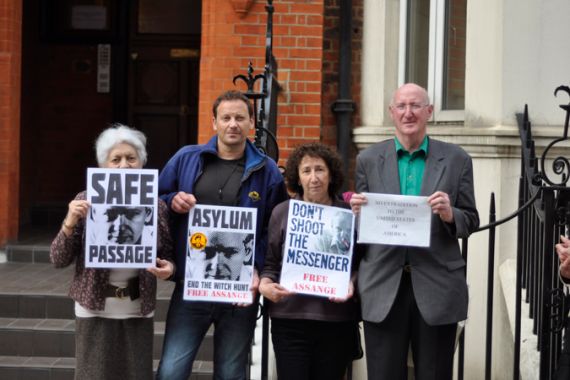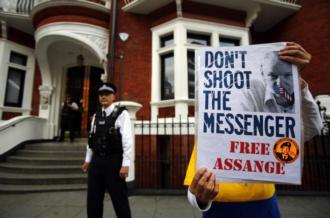Julian Assange supporters stand by their man
WikiLeaks chief in limbo a year since taking refuge at the Ecuadorian embassy.

London, United Kingdom – Whenever the stand-off between Julian Assange and British authorities seeking to extradite him to Sweden to answer sex assault allegations finally ends, it seems unlikely to involve a car chase.
The narrow streets around the Ecuadorian embassy, from which the fugitive WikiLeaks founder has not emerged since claiming asylum there one year ago, are a permanent traffic jam of oversized limousines favoured by the local diplomatic community, and chauffeur-driven saloons queued up outside the neighbouring Harrods department store.
Across the road from the embassy in the west London district of Knightsbridge, a small cluster of dedicated Assange supporters have maintained a daily vigil for each of the 365 days that the Australian has been inside.
Most days they number just a handful, standing on the pavement with small banners reading “Free Assange”, “Safe Passage” and “Don’t Shoot the Messenger”, handing out leaflets to curious passers-by for a couple of hours or so each afternoon.
“This is just symbolic, but I think it is important to remind people that Julian is still here inside the embassy,” Clara Torres, a nurse originally from Chile, told Al Jazeera.
For Torres, Assange’s claim to asylum has a deeply personal resonance. She fled to the UK in 1978 after her ex-husband had been held as a political prisoner for two years under Augusto Pinochet’s military rule.
“Asylum is very strong for me. This is the last thing a human being runs to. It is the only way to escape persecution. It was the last resort for him to run into exile,” she said.
 |
| Assange faces extradition over sex assault allegations [EPA] |
Assange sought asylum a year ago after exhausting legal options within the UK to avoid extradition to Sweden, where he is wanted for questioning over allegations of sexual assault made by two women.
He denies the allegations and says he believes he would face subsequent extradition to the United States where Bradley Manning, the soldier accused of leaking confidential diplomatic and military cables to WikiLeaks, is currently facing a court martial that could see him jailed for life.
Torres said the UK should allow Assange to go to Ecuador, just as China last year allowed Chen Guangchen to travel to the US after the dissident had taken refuge in the US embassy in Beijing.
“China let one of its residents go to America and it’s supposed to be the worst country in the world for human rights. And even Pinochet let thousands of Chileans go through the embassies to other countries.”
Vilifying whistleblowers
Standing alongside Torres, Jim Curran, an Irish civil liberties activist, said he had been campaigning against extradition proceedings for nearly 40 years since the height of the Irish Republican Army’s (IRA) campaign against British rule in Northern Ireland in the 1970s, when the UK used its extradition treaty with Ireland to have suspected fighters rendered into its custody.
He said he saw parallels between Assange’s case and that of Colin Wallace, a former British soldier who exposed details about covert operations and a secret black propaganda unit in Northern Ireland, and alleged links between British intelligence agents and loyalist paramilitary groups.
Wallace was wrongly jailed in 1980 for allegedly beating a man to death, but the conviction was eventually overturned.
“We had whistleblowers in Ireland in relation to atrocities that the British government carried out against Irish Republicans. Some of them were British people like Colin Wallace and they were vilified by the establishment. I suppose people who expose malpractice by any government in any country, they get vilified.”
Curran said he was concerned Assange would be shifted on to the US from Sweden as soon as the country’s legal system had dealt with the sexual assault allegations against him, pointing to the country’s past involvement in the US prisoner rendition programme.
|
“Until it signs up at the International Criminal Court, I do not believe that anybody should be extradited to the United States of America. “ – Jim Curran, Irish civil liberties activist |
Sweden was censured by the United Nations’ Committee Against Torture in 2006 over the rendition of two Egyptian men, Ahmed Agiza and Muhammed Alzery, to Egypt in 2001. But it subsequently halted cooperation with rendition flights and paid substantial damages to the pair.
But he said: “While Sweden is an admirable country and has given great help to people campaigning against war and refuseniks and asylum seekers and refugees, that seems to have been deteriorating under the current government.”
‘State terrorism’
Curran said his support for Assange was primarily motivated by concerns over the UK’s current extradition arrangements. He said he opposed both the European arrest warrant system, which requires all European Union member states to detain and transfer suspects wanted elsewhere in the EU, and all extraditions to the US.
“Until it signs up at the International Criminal Court, I do not believe that anybody should be extradited to the United States of America,” he said.
But he added: “Assange has focused international attention on what I call state terrorism and that is very important. I believe in freedom of speech and a free press. I believe all governments should be transparent in what they do because they are responsible to voters and taxpayers, and they shouldn’t be engaging in clandestine operations.”
Assange has been accused by some critics of inspiring the sort of devotion among his acolytes usually associated with cult leaders.
“The problem is that WikiLeaks … has been guilty of the same obfuscation and misinformation as those it sought to expose, while its supporters are expected to follow, unquestioningly, in blinkered, cultish devotion,” Jemima Khan, one of many former supporters to have fallen out with Assange, wrote in the New Statesman magazine earlier this year.
But Torres rejected Khan’s criticism: “I don’t agree with her. They’re trying to deface his character, and saying horrible things. I don’t think he is the Messiah or anything like that. He is just a very brave and intelligent man.”
Long haul
Speaking to Al Jazeera’s Listening Post this week, Assange said he would be “reasonably surprised” if his situation at the embassy had not been resolved within two more years. But Ricardo Patino, Ecuador’s foreign minister, said after talks on Sunday that Assange had told him he was prepared to remain inside for another five years if necessary.
 |
| Assange prepared to stay five years if necessary [Getty Images] |
Lance Rolls, a researcher originally from New Zealand and a regular attendee at the vigil, said the situation was a “poor reflection on UK society”.
“I was here the day after I heard he’d gone into the embassy, and I wanted to be there to be a witness. And these guys have been here for him now all through the winter and the snow.”
Like others at the vigil, Rolls stated that Assange should answer the allegations he faces, although he said he should be given the opportunity to do so in a third country where he would not be at risk of extradition to the US.
But he added the efforts of whistleblowers such as Manning and Edward Snowden, currently hiding in Hong Kong after revealing details of US surveillance programmes, had exposed bigger concerns.
“As a society we are getting smothered and we are getting controlled, especially with all the technology. Where we are heading, we have got to be very careful.”
Follow Simon Hooper on Twitter: @Hooper AJ